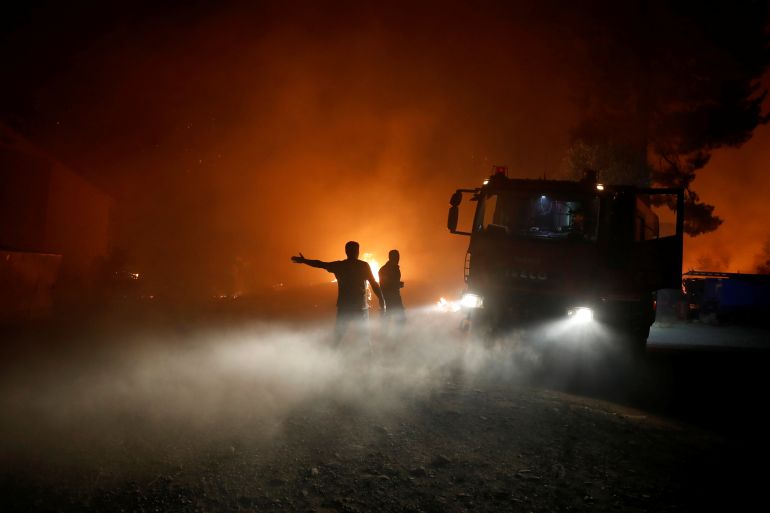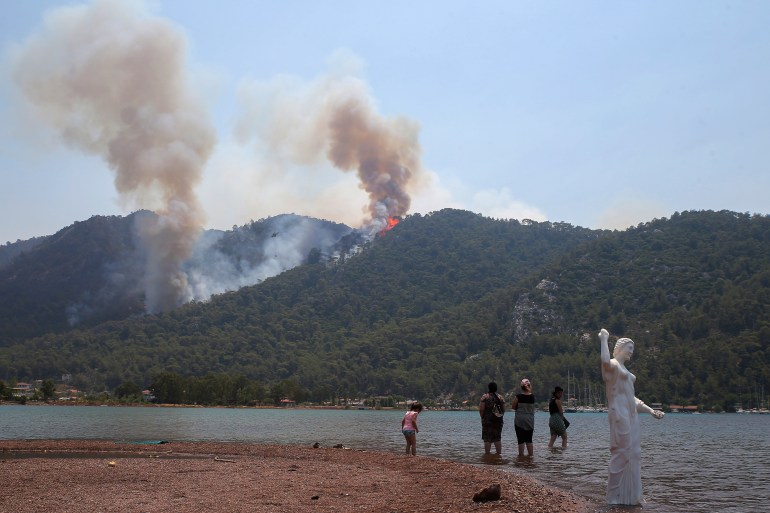Greece: Hundreds rescued by sea as more people flee wildfires
Further waves of people join others seeking safety from the heatwave-fuelled fires gripping the Mediterranean region.

Thousands of people fled wildfires burning out of control in Greece and Turkey on Friday, including a major blaze just north of the Greek capital of Athens that left one person dead, as a protracted heat wave turned forests into tinderboxes and flames threatened populated areas, electricity installations and historic sites.
On the Greek island of Evia, the coastguard mounted a major operation to evacuate hundreds of people by sea, using patrol boats as well as fishing and private vessels to rescue residents and vacationers from encroaching flames overnight and into Friday.
Keep reading
list of 4 itemsPower plant in Turkey evacuated as wildfire closes in
In Pictures: Thick smoke over Athens as suburbs battle wildfires
Greek firefighters battle ‘raging’ forest fire near Athens
Dozens of other villages and neighbourhoods were emptied in the southern Peloponnese region and just north of the Greek capital, Athens, as blazes raced through pine forests.
“We’re talking about the apocalypse, I don’t know how to describe it,” Sotiris Danikas, head of the coastguard in the town of Aidipsos on Evia, told state broadcaster ERT, describing the sea evacuation.
Coastguard spokesman Nikos Kokkalas told ERT that 653 people had been evacuated from beaches in northeast Evia after all other means of escape were cut off by the fires.
Athens’ main trauma hospital said a 38-year-old man died after sustaining a head injury from a falling utility pole in Ippokrateios Politeia, one of the neighbourhoods north of Athens affected by the fire.
Historic heatwave
Fires have raged in many parts of Greece as the country has been baked by a prolonged heatwave that sent temperatures soaring to 45 degrees Celsius (113 degrees Fahrenheit).
Although temperatures dipped below 40C (104F) for the first time in nearly 10 days in many areas on Friday, strong winds were predicted for the afternoon for much of the country, weather that could further hamper firefighting efforts.
“We are going through the 10th day of a major heatwave affecting our entire country, the worst heatwave in terms of intensity and duration of the last 30 years,” Fire Service Brigadier General Aristotelis Papadopoulos said.
Thousands of people have fled their homes or holiday accommodation, while at least 20 people, including four firefighters, have been treated for injuries.
Two of the firefighters were in intensive care in Athens, while another two were hospitalised with light burns, the Health Ministry said.
More than 1,000 firefighters and nearly 20 aircraft are now battling major fires across Greece. Several European countries are sending or already sent firefighters, planes, helicopters and vehicles to help.
Blazes rage in Turkey
Meanwhile, in neighbouring Turkey, wildfires described as the worst in decades have swept through swaths of the southern coast for the past 10 days, killing eight people.
Authorities evacuated six more neighbourhoods near the town of Milas, in Mugla province, on Friday as a wildfire fanned by winds raged some five kilometres (three miles) from a power plant.
At least 36,000 people were evacuated to safety in Mugla province alone, officials said.
Meanwhile, several excavators cleared strips of land to form firebreaks in a bid to stop flames from reaching the Yenikoy plant, the second such facility to be threatened by wildfires in the region.

On Wednesday, a fire reached the compound of the coal-fuelled Kemerkoy power plant, forcing nearby residents to flee in navy vessels and cars.
It was contained on Thursday after raging for some 11 hours and officials said the plant’s main units were not damaged.
Wildfires that had been blazing near the tourism resort of Marmaris, also in Mugla province, were largely contained by late Thursday, officials said, while at least two fires were still burning in Antalya province, another beach holiday destination.
‘Nothing is left’
In Greece, firefighters went door to door in areas around 20 kilometres (12.5 miles) north of Athens telling people to evacuate, while helicopters dropped water on towering flames and thick smoke blanketed the area.
Authorities sent push alerts to mobile phones in the area urging residents to evacuate.
Constant flare-ups that threatened inhabited areas hampered the work of hundreds of firefighters there.
The fire halted traffic on the country’s main highway connecting Athens to northern Greece on Thursday and damaged electricity installations, leading the power distribution company to warn of the possibility of rolling power cuts.
In the Drosopigi area, resident Giorgos Hatzispiros surveyed the damage to his house on Friday morning, the first time he saw it after being ordered to evacuate the previous afternoon.
Only the charred walls of the single-storey home remained, along with his children’s bicycles, somehow unscathed in a storeroom. Inside, smoke rose from a still-smouldering bookcase.
“Nothing is left,” Hatzispiros said. He urged his mother to leave, to spare her the sight of their destroyed home.
‘The reality of climate change’
In southern Greece, nearly 60 villages and settlements were evacuated on Thursday and early Friday.
In addition to Evia, fires were raging in multiple locations in the southern Peloponnese region where a blaze was stopped before reaching monuments at Olympia, birthplace of the ancient Olympic Games.
A summer palace outside Athens once used by the former Greek royal family was also spared.
The fires have also disrupted COVID-19 vaccinations. The Health Ministry announced the suspension of vaccinations at centres in areas affected by the fires, saying appointments could be rescheduled when conditions allowed.

“Our priority is always the protection of human life, followed by the protection of property, the natural environment and critical infrastructure. Unfortunately, under these circumstances, achieving all these aims at the same time is simply impossible,” Prime Minister Kyriakos Mitsotakis said in a televised address delivered on Thursday night.
The wildfires, he said, display “the reality of climate change”.
In 2018, more than 100 people died when a fast-moving forest fire engulfed a seaside settlement east of Athens. Some of them drowned trying to escape by sea from the choking smoke and flames after becoming trapped on a beach.